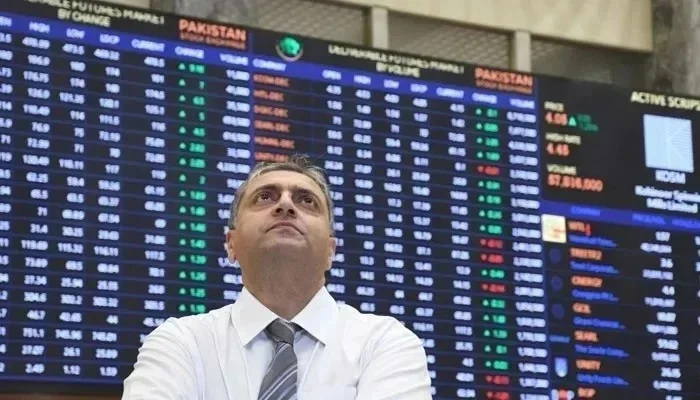The Pakistan Stock Exchange (PSX) witnessed a continued decline, with the benchmark KSE-100 Index dropping 2,671.87 points (2.41%) during early trading on Thursday. This follows Wednesday’s record-breaking loss of 3,790 points, marking the steepest single-day decline in PSX history.
Key Drivers of Market Decline
- Foreign Outflows:
- Profit and dividend repatriations by multinational companies surged by 112% year-on-year to $1.128 billion in the first five months of FY25.
- November alone saw $321.6 million repatriated, a 586% year-on-year increase, reflecting eased restrictions on dollar outflows.
- Investor Sentiment:
- Profit-taking intensified, driven by concerns over macroeconomic risks and uncertainty surrounding the State Bank of Pakistan’s (SBP) monetary policies.
- Weak global crude oil prices and rupee instability further dampened market confidence.
- Tax Reforms:
- The Tax Laws (Amendment) Bill, 2024 sparked fears of reduced consumer liquidity.
- Proposals include:
- Restricting non-filers from purchasing high-value assets and conducting large financial transactions.
- Empowering the Federal Board of Revenue (FBR) to freeze accounts and block property transfers of non-compliant individuals.
Expert Commentary
Ahsan Mehanti, CEO of Arif Habib Commodities, stated:
“Stocks are bearish on concerns for foreign outflows and cautious SBP policy easing on susceptible multiple risks. Consolidation in blue-chip scrips, rupee instability, and weak global crude oil prices played a catalyst role in bearish activity.”
Positive Economic Indicators
Despite market turbulence, Pakistan’s macroeconomic fundamentals continue to improve:
- Current Account Surplus:
- Surplus of $729 million in November—the highest monthly figure since 2015.
- Cumulative surplus of $944 million in the first five months of FY25, compared to a $1.67 billion deficit in the same period last year.
- Foreign Direct Investment (FDI):
- FDI increased by 31% year-on-year to $1.124 billion, with notable contributions from China, Hong Kong, and the UK.
- Remittance Growth:
- November remittances rose by 29% year-on-year to $2.9 billion, totaling $14.8 billion for the first five months of FY25.
- Growth driven by government incentives encouraging formal banking channels.
- Inflation and Monetary Policy:
- The SBP reduced the policy rate by 200 basis points to 13%, marking the fifth consecutive rate cut as inflation dropped to 4.9% in November, the lowest since April 2018.
Outlook
While short-term market volatility persists, Pakistan’s improving macroeconomic fundamentals, such as rising FDI, remittances, and a shrinking current account deficit, provide a foundation for long-term investor confidence. However, restoring stability will require addressing foreign outflows and ensuring clarity on fiscal and monetary policies.
To Keep Updated Visit & Follow our Facebook Page Or Our Website




